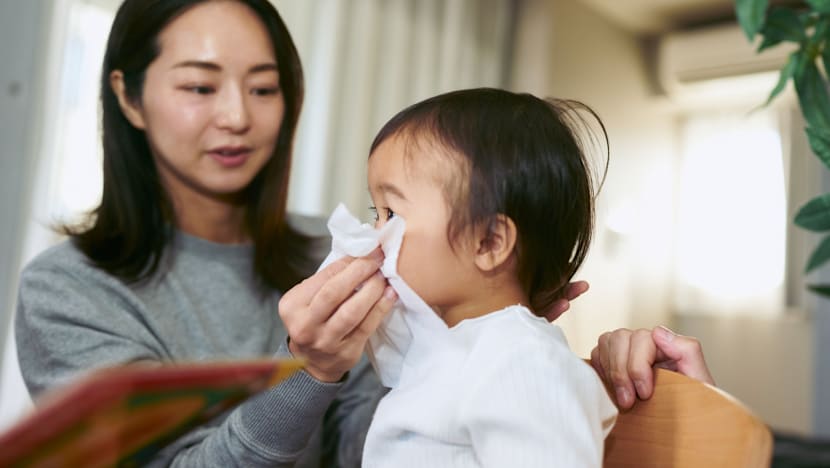Health
New Strategies Emerge to Combat RSV in Infants Globally

Respiratory syncytial virus (RSV) is a significant health concern for infants worldwide. This year, the virus continues to circulate among Singapore’s youngest residents, often appearing like a common cold. Despite its typical presentation, RSV can lead to severe complications in infants, requiring hospital care. Data from the Communicable Diseases Agency (CDA) indicates that RSV consistently ranks among the top pediatric viruses detected in children treated for acute respiratory infections in Singapore.
A study published in Emerging Infectious Diseases highlights that RSV is a leading cause of hospital admissions for acute lower respiratory tract infections among young children in Singapore, particularly affecting infants under six months and toddlers up to 29 months. Globally, the World Health Organization (WHO) estimates that RSV causes over 3.6 million hospitalizations and approximately 100,000 deaths each year in children under five.
Recognizing the Symptoms of RSV
RSV is highly contagious, spreading through droplets when an infected person coughs or sneezes. While it typically results in mild symptoms for older children and adults, it can cause significant complications in infants. Symptoms usually appear within four to seven days post-exposure, starting with a runny nose, sore throat, headache, fatigue, and fever. As the illness progresses, these symptoms may escalate to include coughing, shortness of breath, and wheezing.
Professor Juan Pablo Torres, a pediatric infectious diseases specialist at the Children’s Hospital Luis Calvo Mackenna in Santiago, Chile, notes that RSV may initially present subtly in infants, often causing decreased feeding. He explains, “In the following days, they start having respiratory symptoms, especially cough. Some of the more severe cases can develop polypnea, or rapid breathing, which may lead to respiratory failure. These infants may need hospitalization, oxygen support, pediatric intensive care, or even mechanical ventilation.”
The Broader Impact of RSV on Infants
Prof. Torres emphasizes that nearly all children worldwide will contract RSV by age two, including healthy full-term infants. He states, “We are dealing with a virus that is very common. Unlike some infections where attention is focused on high-risk groups, RSV often affects healthy infants. It is the main cause of bronchiolitis and pneumonia in this age group.” Approximately 70 to 80 percent of RSV-related hospitalizations involve infants without underlying health conditions.
Certain infants, including those born prematurely or with congenital heart conditions or chronic lung disease, face an elevated risk of complications. While most children recover completely, a more severe RSV infection may lead to lasting effects. Prof. Torres indicates that around 20 to 30 percent of affected infants may later experience asthma or airway hyper-reactivity.
Innovative Approaches to Prevent RSV
In recent years, new strategies have emerged to better protect young children from RSV. In 2024, Chile implemented a national RSV immunization strategy, becoming the first country in the Southern Hemisphere to do so. Over six months, the state-funded program administered a single dose of a targeted monoclonal antibody immunization to more than 150,000 infants under six months, including both healthy full-term babies and those at higher risk.
Findings published in The Lancet Infectious Diseases revealed an almost 80 percent reduction in RSV-related hospitalizations, with no recorded RSV-related deaths in children under one year— a significant decrease from the 13 deaths reported the previous year.
In Singapore, experts have called for increased protective measures against RSV. A panel of pediatricians recently released a consensus statement highlighting the urgency of protecting all infants from the virus. They recommend considering the inclusion of immunization within the National Immunisation Programme to alleviate the burden of RSV on the healthcare system.
As immunization options expand, the momentum to bolster early defenses against RSV is growing. Prof. Torres believes that fostering public trust through education is crucial. “Healthcare professionals play a vital role in sharing evidence-based information with families,” he states.
In addition to medical advances, hygiene practices remain essential in preventing the spread of RSV. The CDA recommends regular handwashing, wearing masks when unwell, and minimizing close contact during illness. Parents are encouraged to keep sick children out of school or childcare to prevent further transmission.
As prevention strategies evolve, families and healthcare professionals have more resources to protect vulnerable infants from RSV. Prof. Torres underscores the importance of early action and informed choices: “When it comes to RSV, early action, shared understanding, and informed choices can make a meaningful difference.” For those concerned about their infant’s health, consulting a healthcare professional about available preventive measures, including immunization, is advisable. For further information, visit TogetherAgainstRSV.sg.
-

 Business5 months ago
Business5 months agoKenvue Dismisses CEO Thibaut Mongon as Strategic Review Advances
-

 Lifestyle4 months ago
Lifestyle4 months agoHumanism Camp Engages 250 Youths in Summer Fest 2025
-

 Sports4 months ago
Sports4 months agoDe Minaur Triumphs at Washington Open After Thrilling Comeback
-

 Sports5 months ago
Sports5 months agoTupou and Daugunu Join First Nations Squad for Lions Clash
-

 Top Stories5 months ago
Top Stories5 months agoColombian Senator Miguel Uribe Shows Signs of Recovery After Attack
-

 World5 months ago
World5 months agoASEAN Gears Up for Historic Joint Meeting of Foreign and Economic Ministers
-

 Health4 months ago
Health4 months agoNew Study Challenges Assumptions About Aging and Inflammation
-

 Business5 months ago
Business5 months agoOil Prices Surge Following New EU Sanctions on Russia
-

 Entertainment4 months ago
Entertainment4 months agoDetaşe-Sabah Violin Ensemble Captivates at Gabala Music Festival
-

 Entertainment4 months ago
Entertainment4 months agoBaku Metro Extends Hours for Justin Timberlake Concert
-

 Top Stories5 months ago
Top Stories5 months agoRethinking Singapore’s F&B Regulations Amid Business Closures
-

 Business5 months ago
Business5 months agoU.S. House Approves Stablecoin Bill, Sends to Trump for Signature









